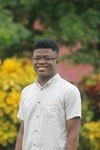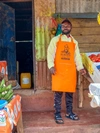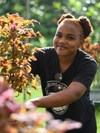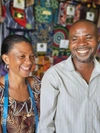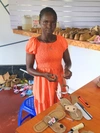Reimagining Social Ventures During COVID-19

2020 Social Venture Challenge winners share their journey
As this year’s Social Venture Challenge teams prepare to pitch their ventures to a panel of judges, we revisit a few of last year’s teams to see how they are faring and what role reimagining and resilience have played in their entrepreneurship journey.
A Hand for a Refugee
Tell us about yourself and the name of your team
We are a group of three Mastercard Foundation Scholars (Safali Libia from Democratic Republic of Congo, Kataike Viola, and Kevin Githuku both from Uganda) and we study at the Makerere University, Uganda. Our venture, A Hand for A Refugee, aims at raising refugee welfare and ensuring sustainable support for education among teenagers in Uganda’s Kyangwali Refugee Settlement.
What is the challenge that your venture, A Hand for a Refugee, is addressing and what has been the impact so far?
Kyangwali is a refugee settlement in Uganda hosting about 12,000 people. Most of the residents depend on subsistence farming for food. Inspired by our experiences in the camp, and reduced food support programs, we thought of designing a sustainable solution by modernizing agriculture to support the residents.
In our pilot program, we utilized the skills learnt in school to help farmers grow hybrid passion fruits. We are currently expanding the program to more crops, and we hope to recruit more farmers to the project. Winning the venture in our freshman year, we have inspired Scholars with great ideas to support their communities to express themselves and be part of impact.
How did you feel when you were announced as a winner of the Social Venture Challenge and how has winning impacted your venture?
We felt super excited and very proud of our hard work. It was a blessing and inspiration to fellow Scholars with social entrepreneurship projects. Winning gave us a big push in realizing our dreams. Since we were at the initial stages of the project, we were inspired to take the bull by the horns. So far, we have started a pilot farm and recruited over 50 farmers to the project. We have been inspired by the win and currently, we are among the finalists for the 2021 Anzisha Prize.
How have you had to reimagine your venture since winning last year? How do you see it changing again in the post-Covid year?
Resilience has been our motto during the pandemic. With education transitioning to online platforms, we have had time to implement and run our project. Therefore, the pandemic was a blessing in disguise. Post pandemic, we are looking forward to expanding our venture beyond the Kyangwali refugee camp.
What have you learned about leadership as a Social Venture Challenge winner and as an entrepreneur?
We have learnt on the importance of teamwork and mentorship. Also, having a common goal is critical while running an entrepreneurial venture.
What advice do you have for the current SVC finalists?
Our advice is to stay focused on your venture, do more research, be confident and passionate about your project. Utilize every opportunity to learn and make your venture better.
Kibera-Caanan Library & Youth Empowerment Center

Kibera Caanan Library and Youth Empowerment Center team with a group of program participants in Kibera, Kenya.
Tell us about yourself and the name of your team
We are Grace Bako and Dorris Mwangi, Scholars from the University of Cape Town and University of Nairobi respectively. Our Venture’s name is Kibera Caanan Library and Youth Empowerment Center, and we were among the winners of the 2020 Social Venture Challenge.
What is the challenge that your social venture, Kibera Caanan Library and Youth Empowerment Center is addressing and what has been the impact so far?
The problem that we are addressing is the limited access to quality educational resources by children in Kibera, Kenya. We are passionate about working with children. Before leaving to study in South Africa, Grace worked extensively to reconcile several street children in Nairobi with their families. The last 5 years, we also worked jointly to run mentorship programmes for high school students in Nairobi, Nakuru, Thika and Meru.
One other challenge that our social venture identified was the inadequacy of books and libraries in the areas that we operate. We have been holding book drives to equip libraries in these areas and it has been of great impact. Our current project is an amplified version of our previous work to create a safe space for children and youth to be empowered through access to books, mentorship, and skills training.
Our resource center is accessible to over 600 children. During the pandemic, Ushirika School collaborated with us to support the children for four months through mentorship sessions.
We have been able to fundraise USD 1000 as school fees for five children under our mentorship program whose parents had their sources of income cut due to the pandemic. We are currently establishing the library and have donated at least 1800 textbooks to 5 basic schools.
How did you feel when you were announced as a winner of the Social Venture Challenge and how has winning impacted your venture?
We were thrilled to have other people believe in our idea and to know that we have a chance of fulfilling it. Since winning the Social Venture Challenge, we have had invaluable support and insights from Heidi Litner and Byer Keith from The Resolution Project team. We have had lots of trainings by The Resolution Project on equipping us with skills to run the venture, and the seed funding has also helped us to scale our impact in terms of quality and quantity.
How have you had to reimagine your venture since winning last year? How do you see it changing again in the post-Covid year?
We had initially planned to hold physical mentorship sessions with children but with COVID-19 restrictions on public gatherings we shifted to virtual information sessions. This, however, has not been very effective since we can have access to a limited number of children because a lot of them don’t have access to mobile communication devices to connect with us.
Since schools are reopening, we will resume physical mentorship sessions with strict adherence to COVID-19 safety protocols. The number of children we work with might be limited to children from our partner school. We plan to equip the partner school computer lab with computers to run a hybrid program of virtual and physical sessions.
What have you learned about leadership as a Social Venture Challenge winner and as an entrepreneur?
We have learned that leadership is about committing to a cause you care about. We have also learnt to delegate roles to avoid taking on too much and eventually experiencing burn out. Being leaders of an upcoming organisation has also taught us that no work is beneath us. This is because we rely on volunteers (who come and go) and as such, if a task requires our attention, we are always ready to work on it.
What advice do you have for the current Social Venture Challenge finalists?
Making it to the semifinals is evidence that you have a great solution to a real problem. If you win, make the best out of the opportunity but if you do not, use the feedback to find out what you can improve on and try again.
FONA Health Initiative

Samson Idabu
Founder of FONA Health Initiative, Tanzania.
Tell us about yourself and the name of your team
My name is Samson Idabu, a Tanzanian by nationality and a Mastercard Foundation Scholar currently pursuing a bachelor’s degree at the University of Cape Town. I am passionate about solving problems facing the community and seek to share my skills with others to add value and build the capacity of creating a better community. My venture is FONA health Initiative.
What is the challenge that your venture, FONA Health Initiative, is addressing and what has been the impact so far?
Founded in 2019, FONA Health Initiative is a community education, give-back project based in Tanzania that is focused on training vulnerable youth and rural communities about nutrition education to address malnutrition. Our goal is to ensure access to nutritional information in rural communities and use of local resources to develop nutrition products. We also provide the tools and knowledge to produce pumpkin and chickpea seed supplements to address the problem of malnutrition.
How did you feel when you were announced as a winner of the Social Venture Challenge and how has winning impacted your venture?
Winning and being part of the Resolution Fellowship was a big step to FONA Health Initiative, especially during the COVID-19 pandemic. The fellowship has provided tremendous support and has been a safe space to share our achievements, challenges, and downfalls. Currently, we are working with 24 youth to educate the community and supply nutritional supplements.
How have you had to reimagine your venture since winning last year? How do you see it changing again in the post-Covid year?
COVID-19 pandemic has brought a big shift in the plan of action of both small and large businesses. We have however adapted, redefined, and reimagined our business model and approach with resilience and boldness. Before the COVID-19 pandemic we went to the households educating and training the community, after COVID-19 hit our areas, one of the options adopted by many enterprises was to deploy the use of technology and work remotely. As a small enterprise, we had limited technology infrastructure and knowledge among our targeted people. We had to reimagine our approach on training the youth and conveying nutritional information to the community. We introduced a poster delivery approach and mobile phone consultations (using WhatsApp groups) have helped manage and train the youth working with us. We hope to use both approaches post-COVID as the information will reach more people and create a bigger impact.
What have you learned about leadership as a Social Venture Challenge winner and as an entrepreneur?
I have learnt that the greatest asset of a leader is the confidence to change. Business environments change as time passes, so the need to re-imagine working systems is inevitable. Additionally, I have learnt that the venture leadership cannot go higher as the foundation of a leader, if you want the venture to have a successful leadership, you need to build a strong foundation as a leader.
We are grateful for the support provided by the Resolution Project in the form of help us develop digital infrastructure which will in turn equip us to train youth remotely and allow access to nutrition information with ease.
What advice do you have for the current Social Venture Challenge finalists?
I would advise the Social Venture Challenge finalists to spend more time figuring out the core values of the problem they are solving. These values will give them broad expertise on the quality of solution they will offer. This will further help them to stay optimistic, resilient, and bold when challenges come along the way. Finally, it is critical to have a good team and share your deep-down convictions and strong arguments on why you are in that enterprise. These are the reasons that will give the venture identity and strength when tough times come.
Kwabeng Robotics and Mentorship Hub

Ofori Richard and Yamoah Veronica
Founders of Kwabeng Robotics and Mentorship Hub, Ghana
Tell us about yourself and the name of your team
At the 2020 Baobab Summit, Kwabeng Robotics and Mentorship Hub, a tech hub led by Ofori Richard and Yamoah Veronica from Kwame Nkrumah University of Science and Technology, Ghana won the Social Venture Challenge and thus were accepted into the Resolution Fellowship Programme.
What is the challenge that your business, Kwabeng Robotics and Mentorship Hub, addressing and what has been the impact so far?
We are addressing the challenge of the low interest and the gender inequalities in pursuing Science Technology Engineering and Mathematics (STEM) programs at high school and tertiary levels of education.
Mostly innovation and industrialization of any country is STEM-driven. However, in Ghana, the female population is under-represented in the STEM field. As a team, we want to use the motivational effect of robotics and mentorship to ignite their desire for STEM programs and bridge the gap between young men and women when it comes to the interest in pursuing STEM programmes in Ghana.
In May 2021, we held a mentorship session for participants of our programs which was geared towards helping participants understand the essence of STEM programs and why they are the right people to pursue it. Due to the COVID-19 pandemic, the start of the robotics aspect of the project was delayed. We have now purchased the robotics kits and the materials required to start the robotics training session and looking forward to resuming in September.
How did you feel when you were announced as a winner of the Social Venture Challenge and how has winning impacted your venture?
Winning the Resolution Project Social Venture Challenge was one of our best moments in life. It was also overwhelming since it was our first time participating in the Social Venture Challenge and seeing all the great ideas presented, winning meant a lot to us.
When we started the social venture, one of the challenges we encountered as a team was financing so winning the Social Venture Challenge helped us to have access to sources of funds to ensure the smooth running of our project. We have learnt a lot from the Resolution Project community through mentorship and networking. We have also had access to other funding opportunities to scale up the project.
The fellowship offers professional courses that have helped our team to learn and reconsider certain plans and activities for our project.
How have you had to reimagine your venture since winning last year? How do you see it changing again in the post-Covid year?
As a result of the COVID-19 pandemic, we had to reimagine our work and connect to the project participants via virtual interactions and Zoom meetings. Post-COVID-19, many of our project participants will be in the haste of being in classrooms and training sessions physically.
What have you learned about leadership as a Social Venture Challenge Winner and as an entrepreneur?
One of the things we have learnt as Social Venture Challenge Winners is that challenges are inevitable, and they present new ways to innovate and be creative. Additionally, the team you work with must share the same purpose for greater success as entrepreneurs.
What advice do you have for the current Social Venture Challenge finalists?
Our advice to the finalists is that it is easy to win the competition the moment you make to the finals. You were selected from among many competitors. Therefore, be confident in your venture as you present to the panelists. We wish you the best of luck and we are ready to listen to your pitch. Welcome them to the Resolution Project Community!
ISOKOFARMS

Kevin Ganza and Lawali Franck in one of the ISOKOFARMS partners’ pineapple plantations in Rwanda.
Tell us about yourself and the name of your team
ISOKOFARMS, is a venture led by Kevin Ganza and Lawali Franck Ghislain Ki, Mastercard Foundation Scholars from the American University of Beirut. We won the Social Venture Challenge in 2020 and thus were accepted into the Resolution Fellowship Programme.
What is the challenge that your business, ISOKOFARMS, is addressing and what has been the impact so far?
According to a report by the World Bank, about 78 percent of the world’s population live in rural areas and rely largely on agriculture. Most of these farmers are subsistence farmers and are vulnerable to the harmful effects of climate change and due to their low incomes, have low standards of living. In resource-constrained countries, many smallholder farmers lack access to digital markets and knowledge on modern farming techniques. ISOKOFARMS aims to solve these two challenges for farmers by using mobile technology to connect farmers to markets and allow the community of farmers to exchange information on farming techniques to improve farming.
As a result of the COVID-19 pandemic and resultant measures like the lockdowns, farmers were disconnected from physical markets. Digital market accessibility through mobile phones is thus crucial to sustain the livelihoods of farmers. Since last year, ISOKOFARMS have reached more than 30 farming cooperative groups of roughly 7500 farmers who are being enrolled in our mobile smartphone technology. Currently ISOKOFARMS is working with different partners to integrate the system to reach even more farmers and help them access digital markets.
How did you feel when you were announced as a winner of the Social Venture Challenge and how has winning impacted your venture?
We still feel enormously proud of winning the Resolution Fellowship Social Venture Challenge. The Resolution Project and Mastercard Foundation provided not only much needed seed capital but also life-long assistance through mentorship to ensure that our project is successful. Winning provided us with an opportunity and a responsibility to make sure that our work is impacting people in their communities.
How have you had to reimagine your venture since winning last year? How do you see it changing again in the post-Covid year?
The big question after winning the Social Venture Challenge was about sustainability and growth, that is, creating a business model that is consistent albeit adaptable to the challenges of different times as they arise. For instance, we are currently trying to reach farmers and work together whilst complying to COVID-19 protocols. We had to change our ways and become more innovative in using the approaches that enabled us to respond urgently to the COVID-19 situation. We are hopeful that in the post COVID-19 era, we will use the lessons we learned this year to be able to reach more people with little hindrances. It will also give us an opportunity to work more closely with both beneficiaries and our partners.
What have you learned about leadership as a Social Venture Challenge Winner and as an entrepreneur?
As Social Venture Challenge Winners, we have learnt that leadership is about service and the impact you are bringing to the people and how they are benefiting from it. As social entrepreneurs, becoming Social Venture Challenge Winners encourages you to make sacrifices that inspire and motivate you to do things that benefit your community.
What advice do you have for the current Social Venture Challenge finalists?
Don’t lose hope, social entrepreneurship is worth it as it presents a pathway to achieve your personal goals, as well as those of your community. You also have all the support you need through the Mastercard Foundation and Resolution Project, utilize them to advance the mission of your organisation.
